Urticaria is an annoying condition that affects the skin. It manifests itself with "wheals", reddish spots of a more or less extensive diameter and very itchy. But what is it that triggers hives? And what are the symptoms?
Don't store avocado like this: it's dangerousTHEurticaria is an annoying pathology concerning the skin. It manifests itself with "wheals", of the reddish spots of a more or less extended diameter and a lot itchy. But what is it that triggers hives? And what are the symptoms?
The swollen patches appear mainly in summer and are quite widespread and frequent among children. There is extensive literature linking a drug or food allergy to hives, but this is not always the case. Furthermore, urticaria does not need specific treatment, but most of the time the rash resolves spontaneously and within a few days.
Index
What is urticaria, types and how to recognize it
It is a real skin disease and shows itself with a evident rash characterized by pink or red wheals at the epidermal level a lot itchy. These are lesions that can remain confined to a certain area or spread over the whole body and that typically develop in only superficial level. It may happen, however, that the spots are associated with edematous reactions of the deeper layers of the skin and subcutis and, in this case, we would speak more of "angioedema".
Generally a distinction is made between:
- acute urticaria, for which the episodes last less than six weeks and the cause is to be found in a type infection viral o bacterial also contract a couple of weeks before the appearance of the wheals. In short, the rash occurs quickly, becomes more severe after 8-12 hours and then it resolves spontaneously within one day at most two
- chronic urticaria, when the rash persists for a longer time and is rarely due to an allergic cause. It can also happen that allergy tests show some antibodies produced by the same organism against its components: in these cases it is a pathology of autoimmune type which would highlight the presence of other diseases of autoimmune origin, such as celiac disease.
Many cases of urticaria don't need specific treatment since the rash often resolves spontaneously within a few days. Alternatively, an antihistamine can help relieve symptoms, while more severe cases may require a short course of oral corticosteroids.
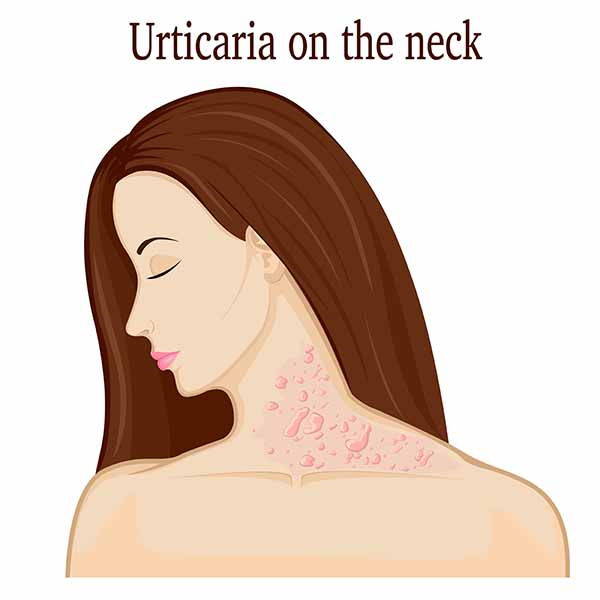
In summary, hives:
- is a skin pathology manifesting as raised, swollen pink-red patches that cause itching
- the patches appear especially during the spring and summer, when several factors contribute to causing it (increased exposure to sunlight, heat)
- it does not need specific treatments, except in more complicated cases
Types of urticaria
It must also be specified that, in addition to the duration of the reaction, other forms of urticaria can be distinguished. The most common are:
- dermographism: dermographic urticaria causes a lot of itching, but scratching causes the further appearance of wheals. Dermographism begins suddenly and is one form of chronic urticaria, due to the fact that even just touching, scratching and rubbing the skin (think of tight clothing, watches or glasses or one rubbing with a towel) can cause swelling and inflammation of the skin
- cholinergic urticaria: it is due to excessive sweating, the application of occlusive dressings, hot baths, fever or even a moment of anxiety or concentration
- urticaria-angioedema from cold, caused by the reaction of the skin to a reduced ambient temperature
- contact urticaria, is none other than the "response" to the contact of a certain substance with the skin and can be of allergic or non-allergic origin, such as the stinging reaction to some plants or animals or drugs
- vasculitic urticaria, associated with inflammation of the blood vessels
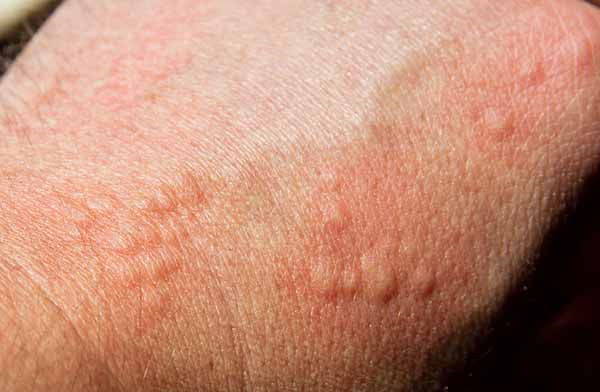
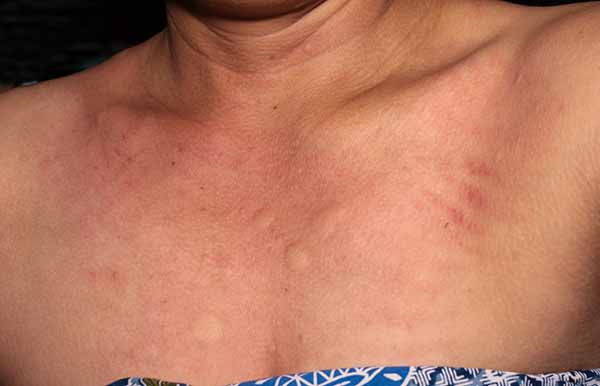
Causes hives
Urticaria is the response of our immune system to a certain stimulus, with the release of histamine (if the reaction is allergic) and other mediators, such as cytokines. This response manifests itself, precisely, with the dilation of blood vessels and a rapid swelling.
There are however many cases where hives have not no obvious cause (idiopathic form).
The most common causes of hives can be:
- a allergic reaction (food allergies, environmental factors such as pollen, drug-induced reactions)
- theexposure to cold or heat
- a 'infection, in some infectious diseases, skin rashes can be a symptom or complication
- il contact with some chemicals found in certain types of foods and medications
Specifically, the non-allergic causes of acute urticaria can be:
- viral, bacterial or parasitic infections, including sinusitis, fascioliasis, Helicobacter pylori, viral hepatitis (A, B and C), mononucleosis, candida
- excessive sweating and emotional reaction to the stress
- external physical stimuli, such as friction or pressure on the skin, water, temperature change, or sunlight.
READ also: SUDAMINE: NATURAL REMEDIES FOR SWEAT BUBBLES IN CHILDREN
While chronic urticaria is the result of autoimmune reactions. Though the causes are not entirely clear, it has been shown that it can often arise contextually to other diseases of similar etiology, as:
- rheumatoid arthritis
- systemic lupus erythematosus
- the periodic syndrome associated with cryopyrin
In rarer cases, chronic urticaria can also be caused by:
- hypothyroidism or hyperthyroidism
- celiac disease
- hepatitis or intestinal parasites

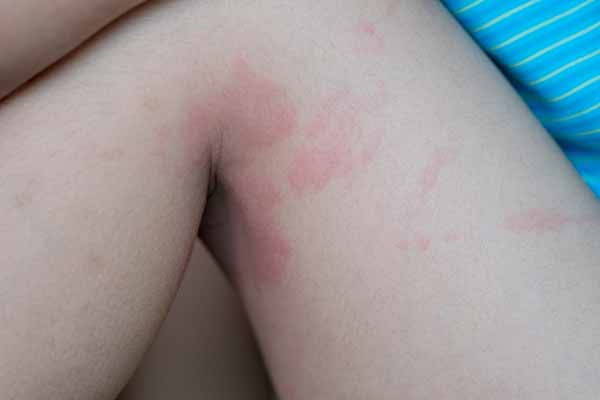
Urticaria symptoms and complications
It is clear that urticaria is characterized by the so-called "wheals“, lsimilar to mosquito bites. In general, the symptoms of an urticaria are:
- reddish bumps, ranging from a few millimeters to several centimeters in diameter
- pruritus
- burning or tingling
- widespread swelling
Many people with acute urticaria and some of those with chronic urticaria are at risk of developing so-called "angioedema”, Which affects different parts of the body, such as eyes, lips and genitals. It is a edema caused by an accumulation of interstitial fluids that occurs at the subcutaneous level or in the submucosal layers. Its symptoms are:
- burning, heat and pain in the swollen areas
- swelling of the conjunctiva
- breathing difficulties
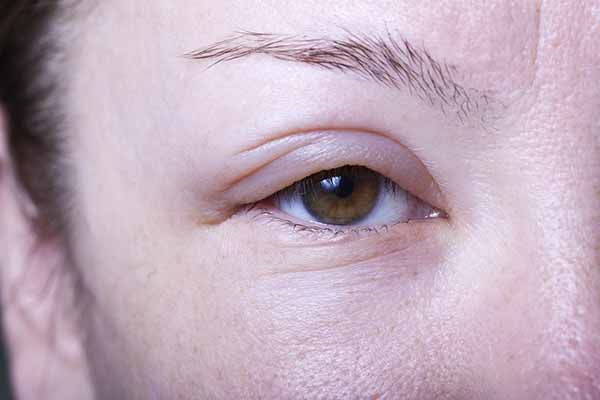
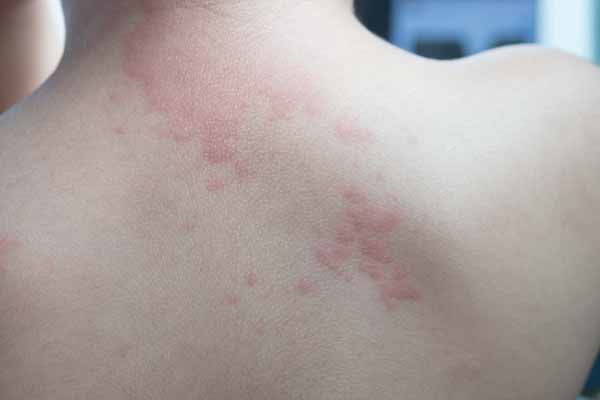
Finally hives can be one of the first symptoms of a severe allergic reaction, the so-called "anaphylaxis”, With dyspnea, weakness and collapse.
READ also: 5 TIPS FOR ACTION IN CASE OF ANAPHYLACTIC SHOCK
In all cases it is always good to consult your doctor.
Hives natural remedies
We have said that in the majority of the times the urticaria regresses spontaneously, without the need for specific treatments or drugs. There are cases, however, in which the dermatosis can be more violent and cause disabling itching attacks. In principle, it is recommended never rub hives affected skin, because rubbing promotes the synthesis of histamine, responsible for the wheals. It may also happen that in some cases the doctor suggests an antihistamine or cortisone therapy.
However, there are effective natural remedies that can greatly alleviate the symptoms of hives, especially when it is mild.
Between these:
- hot or cold water baths, with baking soda and oatmeal
- aloe vera, whose gel relieves inflammation and relieves itching
- essential oil of chamomile, lavender, lemon balm or sandalwood
READ also: ESSENTIAL OILS: 20 POSSIBLE USES FOR BEAUTY, HOME AND HEALTH
- calendula, the quercetin of which it contains has an antihistamine action
- hawthorn, also containing quercetin
- licorice root, ginger and curcumin
If the stress it is the cause of everything, also consider the idea of giving yourself moments of relaxation with yoga or breathing and meditation paths.
On skin diseases, you may also be interested in:
- NATURAL ANTHISTAMINS: 10 REMEDIES TO ALLERGIES
- FIRE OF SANT'ANTONIO: WHAT IT IS, CAUSES AND REMEDIES TO GIVE RELIEF
- ATOPIC DERMATITIS: SYMPTOMS, CAUSES AND EFFECTIVE REMEDIES
Hives and nutrition
Nutrition is one of the most important aspects in the case of hives, so it is good to identify as soon as possible the food to which you are intolerant if not allergic, so that you can appropriately vary your diet.
Foods that can usually induce reactions such as hives are:
- dairy product
- dried fruit, such as peanuts or tree nuts
- eggs
- crustaceans
Attention also to preservatives and additives, so also avoid packaged products and prefer fresh products such as fruit and vegetables, even steamed and brown rice.
Germana Carillo


























